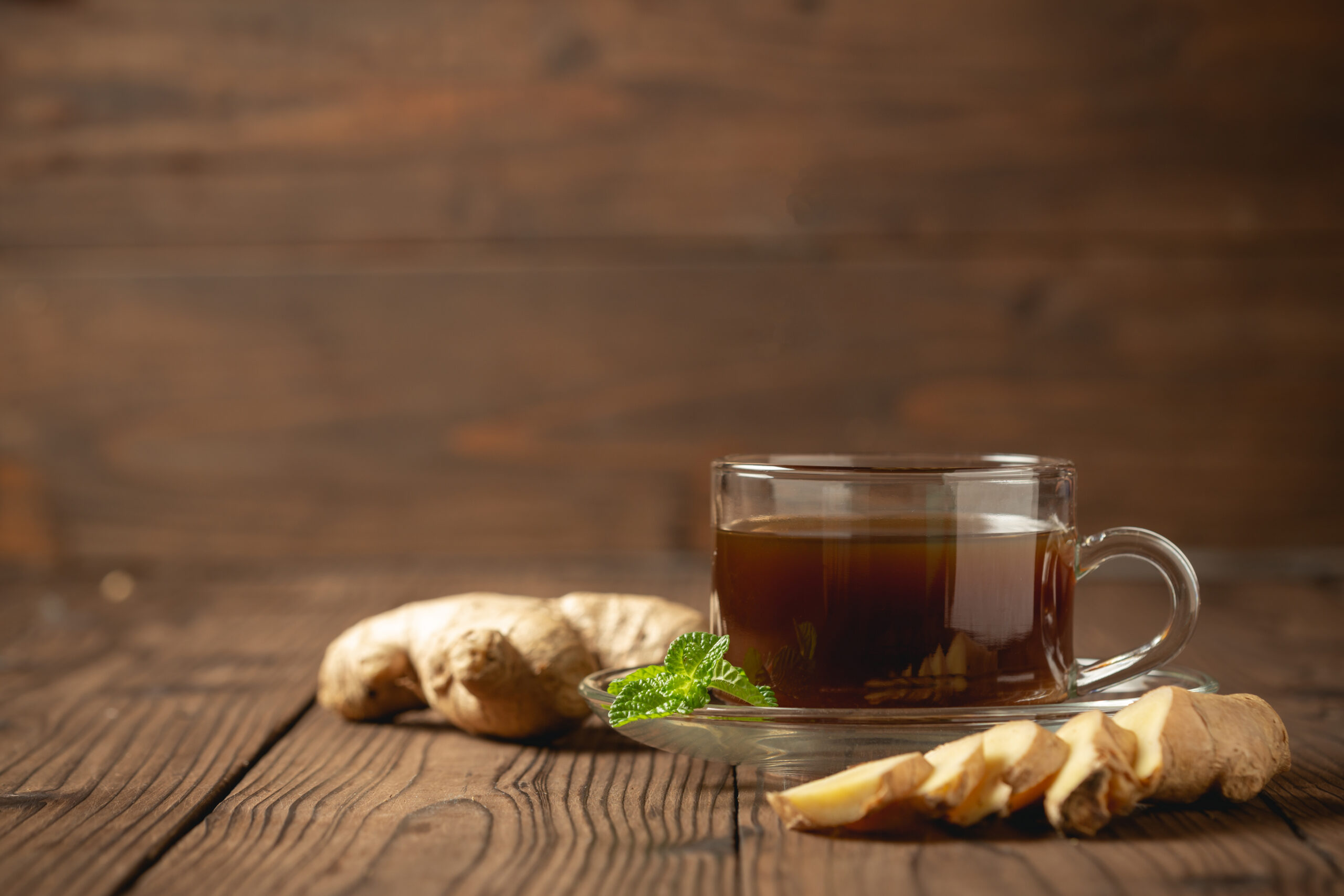
Hot ginger juice and ginger sliced on wooden table.
Ginger Tea.
Making ginger tea is a simple and delightful process that allows you to enjoy the health benefits and unique flavor of ginger. Here’s a basic recipe for making ginger tea:
Ingredients:
- 1 to 2 inches of fresh ginger root
- 2 cups of water
- Optional: Honey, lemon, or mint for flavor
Instructions:
- Prepare the Ginger:
- Wash the ginger root thoroughly.
- Peel the ginger using a spoon or a peeler. You can also leave the skin on for a stronger flavor.
- Slice the ginger into thin, coin-sized pieces. Alternatively, you can grate the ginger for a quicker infusion.
- Boil Water:
- Bring 2 cups of water to a boil in a saucepan or kettle.
- Infuse the Ginger:
- Add the sliced or grated ginger to the boiling water.
- Reduce the heat to low and let it simmer for about 10 to 15 minutes. The longer you simmer, the stronger the ginger flavor will be.
- Strain the Tea:
- Once the tea has simmered to your desired strength, remove it from heat.
- Strain the tea to remove the ginger pieces. You can use a fine mesh strainer or cheesecloth.
- Serve and Add Flavor (Optional):
- Pour the ginger tea into your favorite mug.
- Add honey, lemon, or mint to enhance the flavor. Honey adds sweetness, lemon adds a citrusy zing, and mint provides a refreshing twist.
- Enjoy:
- Sip and savor your ginger tea. It can be enjoyed hot or chilled over ice.
Tips:
- Adjust the ginger quantity to suit your taste preferences. If you like a milder flavor, use less ginger; for a stronger taste, add more.
- Experiment with different variations by adding spices like cinnamon or cloves.
- If you prefer a sweeter tea, you can add a sweetener of your choice, such as honey, maple syrup, or agave syrup.
Variations:
- Ginger Lemon Tea:
- Add a squeeze of fresh lemon juice to your ginger tea for a citrusy kick.
- Honey Ginger Tea:
- Stir in honey to sweeten your tea and add extra soothing properties.
- Ginger Mint Tea:
- Add fresh mint leaves or a mint tea bag during the brewing process for a minty twist.
Making ginger tea at home not only provides a cozy and comforting beverage but also allows you to tailor the flavor to your liking while enjoying the potential health benefits of ginger.
Ginger, scientifically known as Zingiber officinale, is a root widely celebrated not only for its distinct flavor in culinary applications but also for its impressive array of health benefits. This knobby, beige root has been used for centuries in traditional medicine and is renowned for its anti-inflammatory, antioxidant, and digestive properties.
- Anti-Inflammatory Powerhouse: One of ginger’s most well-known health benefits is its potent anti-inflammatory effects. The active compound in ginger, gingerol, has been shown to reduce inflammation, which is crucial in preventing chronic diseases and conditions. Individuals suffering from osteoarthritis and other inflammatory disorders often turn to ginger as a natural remedy to alleviate pain and discomfort.
- Digestive Aid: Ginger has long been revered for its ability to soothe digestive issues. It can help alleviate nausea, making it a popular remedy for morning sickness during pregnancy and for those undergoing chemotherapy. Additionally, ginger has been found to accelerate gastric emptying, providing relief from indigestion and bloating.
- Immune System Boost: The immune-boosting properties of ginger make it a valuable addition to one’s diet, especially during cold and flu seasons. Its antioxidants help combat oxidative stress, supporting the body’s natural defense mechanisms. Regular consumption of ginger may contribute to a stronger immune system and reduced susceptibility to infections.
- Antioxidant Richness: Ginger is rich in antioxidants that help neutralize harmful free radicals in the body. This antioxidant activity is associated with a lower risk of chronic diseases, including certain cancers. The combination of anti-inflammatory and antioxidant properties positions ginger as a powerful ally in the quest for overall health and well-being.
Page 2: Beyond the Kitchen: Exploring Ginger’s Health Benefits in Various Forms
- Cardiovascular Health: Emerging research suggests that ginger may play a role in promoting heart health. It has been linked to lower blood pressure and cholesterol levels. By improving circulation and reducing oxidative stress, ginger contributes to a healthier cardiovascular system.
- Pain Management: Ginger’s anti-inflammatory properties extend to pain relief. It has been found to be effective in alleviating menstrual pain, migraines, and muscle soreness. Some individuals find relief from arthritis pain through the regular incorporation of ginger into their diet or as a supplement.
- Weight Management: Ginger can aid in weight management by promoting a feeling of fullness, which may reduce overall calorie intake. It also helps regulate blood sugar levels, potentially preventing insulin resistance and supporting weight loss efforts.
- Culinary Versatility: Integrating ginger into your diet is not only health-conscious but also delicious. From adding grated ginger to teas and stir-fries to incorporating it into sauces and dressings, the options are vast. Its versatility in both sweet and savory dishes makes it an easy and enjoyable ingredient to include in daily meals.





